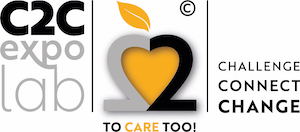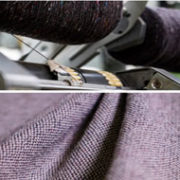INTERREG project on mixed fiber recycling started
INTERREG project on mixed fiber recycling started
Consortium led by imat-uve develops industrial standard for yarns made of old textiles
Mönchengladbach, April 23, 2019 – Today, recycled yarns are produced only from sorted waste, such as PET bottles or plastic waste from the oceans. However, a large part of the textile waste consists of fiber and raw material blends, so that it is not possible to recycle them by type. The remains can only be reused thermally or in downcycling processes.
In preliminary tests, it has now become possible to produce yarns from up to 100 percent recycled mixed fibers with the aid of coarse pre-sorting and modification of the spinning process. In order to advance the technology further and integrate it into the industrial processes of textile recycling an international consortium is being formed under the leadership of imat-uve, a design and development service provider from Mönchengladbach, Germany. Its aim is to develop a process for the mechanical recycling and spinning of old textiles made of different fiber material. This should make it possible to integrate unsorted textile waste into an upcycling process according to industrial standards and to create new yarns with fiber blends.
The requirements of the automotive industry are regarded as the highest goals of the application. But, the developed yarns should also be available to other sectors such as architecture, home textiles and clothing. In the sense of a circular economy with cradle-to-cradle (C2C) principles, the joint project is intended to reduce the CO2 footprint of textiles and to strengthen the textile industry in the Rhine-Meuse region. This process and product innovations help establishing the textile industry in the border region Germany-Netherlands as an innovation leader in the field of mixed fiber recycling and textile recycling.
Besides imat-uve, the consortium consists of the partners C2C ExpoLAB, FBBasic, Stichting Texperium and Trützschler. The project is supported by the European Union as part of the INTERREG programme Germany-Netherlands and is co-financed by the North Rhine-Westphalian Ministry of Economic Affairs (MWIDE NRW), the Dutch Ministerie van Economische Zaken en Klimaat (EZK) and the provinces of Limburg and Overijssel.
About imat-uve
imat-uve is an innovative, independent development and engineering company that supports its customers from the idea to the finished product along the entire process chain. This includes project identification, design and development as well as the testing of materials, components and systems. In this project, imat-uve takes over the project management, with the entire project planning (development and support of the design of experience / test plan) and coordination and control of the partner activities. imat has its own materials laboratory, in which the necessary development tests of the yarns and fabrics are carried out. imat’s textile designers develop fabric samples that have to be produced by a weaving mill. This is where imat’s existing textile and automotive industry network comes into effect. Furthermore, imat and C2C Expolab take over the communication and PR activities, such as the planning and implementation of trade fairs, workshops and publications. www.imat-uve.de
About Texperium
Texperium is an Open Innovation Centre for high quality textile recycling in the Netherlands, with an impact throughout Europe. The Open Innovation Center aims to ensure that textile recycling and the development of the recycling economy become “business as usual” and state of the art in the coming years. This objective will be strengthened by cooperation in the project “Transitagenda Konsum”, which is part of “Nederland circulair in 2050”. Texperium specialises in consultancy and innovation in the field of textiles and mechanical recycling. Texperium has state-of-the-art research facilities for companies and institutions to support the development of innovations in textile reproduction and the use of recycling materials in sustainable and profitable applications. The research facility bridges the gap between scientific research (small-scale, science-driven) and industrial development through experimental and pilot facilities on a semi-industrial scale. In this project, Texperium is responsible for technical yarn development. In cooperation with imat, the experimental design is drawn up and various fiber blends are developed into yarns. Texperium provides the technical competence in the field of recycled fibers as well as spinning processes, which are necessary for the high complexity of this project. www.texperium.eu
About C2C ExpoLAB
The C2C ExpoLAB specialises in the practical application of the Cradle to Cradle principle in the built environment and the political actions of public authorities. It helps clients such as public authorities and educational institutions as well as contractors, architects and construction companies. It also advises on the formulation of policy objectives, tenders and reconstruction projects, in order to make money and save money with the principles of the economic cycle in an innovative way by applying C2C principles to projects. The C2C ExpoLAB thus helps to create a healthy, better world and acts in the conviction that the application of the economic cycle and Cradle to Cradle also has a positive influence on the various business cases of companies. Sustainable solutions should be cleverly combined with each other and thus bring synergy advantages. With each new project the demand should increase even further and realize a significant added value for the customer and the users of the building or product. www.c2cexpolab.eu
About FBBasic
In order to maintain textile production in Europe and to return parts of it to Europe, locally available raw materials are necessary, but hardly any raw materials are available here. This is the basis for the principle “from Fossil Mining to Urban Mining”. FBBasic and its subsidiaries COFA and Cirmar work together with customers and partners according to this principle to create the transition from passive to active recycling. The core activity of FBBasic is consulting, especially in the areas of operational and IT processes. Without circular systems, such as return logistics and the corresponding IT systems for material identification and Track & Trace, circular products are not possible. FBBasic cooperates with many industries, a large part of which is workwear and safety clothing (including safety shoes and personal protective equipment). In recent years, circular products have been developed for and with several companies in this sector, but circular systems (such as return logistics, material passport and database as well as IT dashboard for positive impact) have also been set up. The projects carried out by FBBasic are predominantly international. In this project, FBBasic (in addition to the core topics of C2C ExpoLAB) advises the consortium in the processes of return logistics and the IT systems required for this, so that recycling can already be planned at the beginning of the design and development process of the yarns and products. This is the only way to create truly circular products. This input will also find its place in the planned workshops. In addition, FBBasic brings into the project a network developed over 20 years in the field of recycling management and the textile industry. www.fbbasic.com
About Trützschler
The Trützschler Group is a German textile machine manufacturer based in Mönchengladbach. The family business is divided into the Spinning, Nonwovens & Man-Made Fibers and Card Clothing divisions. Machines, systems and accessories for spinning preparation, the nonwovens industry and the man-made fiber industry are produced at eight locations worldwide. In addition to the four plants in Germany, these include production sites in China, India, the USA and Brazil as well as a development site in Switzerland. In the spinning business area (yarn spinning), the Trützschler Group is the technology and market leader in spinning preparation for the cotton and man-made fiber sectors. The high-tech textile machines support fiber preparation from the “blowroom” to the “carding machine” to the “draw frame”. Only after these process steps have been completed can the so-called card sliver or draw frame sliver be fed to the spinning machines for yarn production. Spinning processes and yarn quality are significantly influenced and determined by this preliminary work. The technological challenge in this process is the spinning of very short fibres of different thicknesses resulting from tearing processes. The fibre preparation of recycled mixed fibres results in a very inhomogeneous fibre mass, which is why this process step is of great importance in the project. Trützschler will support the consortium in this challenge with know-how so that the optimal process sequences and parameters can be defined. In addition, Trützschler will provide machine capacities for running test series in its in-house pilot plant. Due to the concise and established market position in the textile industry of the region and worldwide, Trützschler also brings a large network of fiber preparation and processing as well as the spinning mill into the project. The Trützschler Group supports the project at its own expense and does not register any eligible costs with Interreg. www.truetzschler.de
Media contact:
imat-uve gmbh
Nicola Sengpiel-Bender
Monforts Quartier 31, Schwalmstr. 301
41238 Mönchengladbach
Tel. 0049-2161-6865879
Email: [email protected]





